- Home
- Sara Shepard
The Heiresses Page 7
The Heiresses Read online
Page 7
“Saybrook.” James stepped forward and took her face in his big hands. “Just slow down for a minute, and maybe you’ll see how right this is. It will be messy, yeah, but you are my closest friend. You know me better than everyone. I love you. This should have happened years ago.”
He pulled her close and kissed her. Rowan shut her eyes. If only it felt dreadful, two shapes fitting together badly. She struggled to pull away, her lips feeling toxic. “I have to go,” she muttered.
It was six thirty by the time she showered, dressed, and gathered her keys, while James languished in the bed. Rowan avoided looking at James for fear of another tidal wave of shame—or desire. Was it even right to leave him here? But if they walked out of the apartment together, someone might see them, and that would be worse.
Rowan’s head swam as she stopped at the Starbucks on the corner. She barely noticed the loud grinder, the pounding world music, or the woman with the Staten Island accent in front of her. After waiting in a long line to get coffee and a muffin, she decided to eat in a little park near her apartment. She was in no hurry to get to work and face her cousin.
As she sat, pedestrians streaming past her, her mind ebbed and flowed over what had happened. Did James actually love her? And was Poppy really having an affair? Rowan couldn’t imagine it, but she supposed anything was possible. It didn’t make what Rowan had done more forgivable, of course. But it certainly explained why James had turned to her.
Finally, when she couldn’t put it off any longer, Rowan stood and made her way down Hudson. Twenty minutes later she turned onto Harrison—and stopped short. NYPD sawhorses blocked the intersection at Harrison and Greenwich. The Saybrook’s building, a gleaming slab of gray limestone and glass that looked particularly beautiful against the bright blue sky, sat at the corner. Yellow police tape surrounded the front entrance, and several ambulances and fire trucks were parked crookedly in front, lights flashing.
Rowan walked cautiously along the sidewalk, her heart speeding up. The police tape cordoned off a small rectangle on the pavement just outside the building; paramedics stood over something covered by a sheet. She looked up. Across the street, people stood on their balconies, men in shirtsleeves and women in spring dresses, their hands over their mouths, staring at the ground.
Corinne swam out from among the crowd, her face ghost-white. She ran to Rowan and clutched her arm.
“What’s going on?” Rowan cried.
Corinne stared at Rowan as if seeing through her. Then she collapsed in Rowan’s arms and started sobbing. The church clock a few blocks down bonged out the half hour.
“Corinne, what?” Rowan stared into her cousin’s face. “What is it?”
Corinne looked at Rowan with wet red eyes. “It’s Poppy,” she said hoarsely, her voice breaking. “She’s dead.”
7
“Corinne!” called a voice as Corinne emerged from her parents’ town car on Monday morning. “Can you comment on your cousin’s suicide?”
“Aster, does she have a history of drug use?” another asked, training a camera on Aster. “Was she mentally ill?”
Corinne pulled her black satin clutch closer to her body, grasped her mother’s hand, and hurried faster up toward the Cathedral Church of St. John the Divine on Amsterdam Avenue. A newsstand stood at the curb; Poppy’s face was splashed on every front page. “Carat, Cut, Clarity, Calamity,” read one headline. “City Mourns a Flawless Diamond,” read another. “A Fall from Grace.” There was a photo of Poppy at a gala at the Met, staring off into space, her eyes large, her mouth puckered, and her jaw tense. Another paper showed a photo of Poppy’s lumpy shape under the sheet on the sidewalk outside the Saybrook’s offices.
Corinne couldn’t get the morning of Poppy’s death out of her mind. She’d arrived at Saybrook’s just six minutes after Poppy jumped, still reeling from seeing Will Coolidge the day before. There had been a crowd of people around the entrance, and at first she’d been annoyed. But then she’d noticed a paramedic leaning over someone on the sidewalk.
Corinne had pushed through the throng when suddenly a Saybrook’s guard grabbed her. “Stay back, Corinne,” he said in a firm voice. It was a sweet Irish guy, Colin, who always invited Corinne and Dixon out with him and his buddies to drink on Saint Patrick’s Day.
“What’s going on?” Corinne had demanded, her heart thudding against her rib cage.
Colin had looked at her. And then he’d mouthed the name. Poppy.
Years ago, at an amusement park on the Cape, Poppy had talked Corinne into going on a ride called the Rotor, a barrel that spun and spun until, abruptly, the ground went out below your feet and the riders stuck to the sides by centrifugal force. That was how she’d felt, seeing Poppy’s body splayed across the sidewalk. It had been several days now, and every morning she expected to wake up and see an e-mail from Poppy, or a missed call. It has to be a mistake, she kept thinking, even as it became painfully clear that it was not.
“Rowan! Was there a business scandal?” another reporter shouted to Rowan, who was behind Corinne. “Trouble in her marriage?”
“Was she depressed about her parents’ death?” another reporter screamed.
“Did she leave a note?”
Corinne’s heart wrenched. Police had gone through Poppy’s office, and there it had been, typed in a Word document on her computer screen. “I just can’t handle it anymore,” it read. “I’m sorry. Good-bye.” Proof that Poppy, the most together-seeming of their cousins, had taken her own life.
As soon as everyone was inside the airy, high-ceilinged cathedral, away from the press, Corinne drifted to Rowan and gave her a huge hug. She looked deathly pale; Rowan hadn’t been to work all week, and now Corinne wondered if she was taking it harder than the rest of them. Aster stood next to her, her gaze on the floor.
Corinne touched her sister’s arm. “Hey,” she said gently, her voice breaking. Now their fight seemed so petty.
Aster looked up. Her lips parted. Corinne opened her arms, and Aster fell into them. “It’s so awful,” Aster sobbed in Corinne’s ear. “It makes no sense. She had everything.”
“I know,” Corinne whispered.
Variegated light streamed in through the stained glass windows inside the cathedral. Mourners in black stood in small clumps, some checking their phones, others dabbing their eyes with handkerchiefs. A large birdbath-like structure bearing holy water was off to one side; several people dipped their fingers in and crossed themselves.
The Saybrook family wasn’t religious, but the cathedral’s high ceilings and cool, dark space always made Corinne feel calm and at peace. It was less flashy than St. Patrick’s, where Steven Barnett’s memorial had been five years before.
The memory of Corinne’s grandfather’s funeral here came back to her. It had been at the beginning of what was already proving to be a horrible summer—Dixon had announced that he was going to London to intern at FTSE Group, and, oh yeah, he was breaking up with her. Two weeks later, still completely unmoored, Corinne got the news that her grandfather had suddenly died. She’d just seen Alfred at Meriweather a few days before. He’d given her a pair of three-carat diamond teardrop earrings; when Corinne asked what the occasion was, he just smiled and kissed her cheek. “Simply because you’re my sweet girl.” She could still smell his cigar-and-soap-scented skin. She could still hear his gravelly voice. She could still smell the lime in his gin and tonic.
Her grandfather’s casket had been closed, so Corinne hadn’t been able to kiss him good-bye and tuck those earrings under his satin pillow. A picture of Corinne crying had appeared on the Blessed and the Cursed the following day. Someone had actually sent in an image from inside the church.
Now an usher handed Corinne a program and pointed her through a door. Corinne walked, zombielike, toward the front, her gaze flickering over the sea of mourners crowding the entrance. There were people from work, colleagues from other jewelry empires, models, actors, musicians, and designers. A fashion editor from Vogue
stood along the wall, next to a serious-looking blond woman in a business suit.
Mourners rushed toward Corinne, offering words of sympathy. Winston and Sullivan, her teenage cousins from California, hugged her hard. Their mother, Aunt Grace, who almost never came to New York, approached next, hugging Rowan tight. Rowan’s brothers, Michael and Palmer, who’d flown in, pulled her in for bear hugs. “It’s such a tragedy,” said Beatrice, Poppy’s twenty-five-year-old second cousin on her mother’s side. Her words seemed especially hollow; Corinne wondered if it was because Poppy had passed her over for a promotion several months ago.
Corinne hugged a few more people from Saybrook’s, and an accessories editor from Vogue. People streamed past her, their faces blending together. Danielle Gilchrist gripped her hand. “I’m so sorry—I can’t believe it,” she murmured. And Danielle’s mother, Julia, stood next to her, her eyes full and sad. Corinne hadn’t seen Julia in years, since she’d divorced her husband, but she looked as though she hadn’t aged a day.
“My condolences,” Julia told her. “Call if you need anything,” murmured Mrs. Delacourte, Poppy’s old nanny, who had to be almost eighty. “Just horrible,” sniffed Jessica, Edith’s personal assistant, before scuttling toward the front of the church, where Edith was sitting.
“Oh, honey,” Deanna said next, squeezing Corinne tight. “If you’re up for it, we should talk afterward,” she whispered into Corinne’s ear. “About some interviews. But only if you feel ready.”
“I don’t,” Corinne said, pulling back. That was Deanna—she was part Jewish mother, part relentless workaholic, always thinking about the media’s reaction. There would be a People special about the family’s curse, and 20/20 would create a story without a single source. But at this point, Corinne didn’t see the point in doing interviews. She’d already given a brief statement that she had no idea why Poppy might have done such a horrible thing. She had nothing else to add.
Then another hand touched Corinne’s back, and she stared into the face of Jonathan York, president of Gemologique Internationale, one of Saybrook’s biggest competitors. He had also once been Corinne’s uncle by marriage, but he and Aunt Grace had divorced years ago. Jonathan was tall and trim in his dark suit, with salt-and-pepper hair and steely blue eyes. His trophy wife, Lauren, wasn’t on his arm—Corinne had heard they’d split recently. It surprised her, actually, that he was here. He was the one person Poppy never quite managed to get along with. They occasionally had to do business, and more than once after a call with Jonathan, Poppy showed up in Corinne’s office flustered and angry.
“Corinne,” Jonathan said now, touching her hand. “I can’t imagine what your family is going through. It’s such a tragedy.”
Corinne smiled tightly. “Thank you for your sympathy.”
She tried to move on, but he gripped her hand. “Healing takes time,” he added, his mouth close to her ear. “The business will always be there. I wish I had been able to tell Poppy that. I know she was struggling.”
He stared at her patiently, as if she was supposed to know what he was talking about. Struggling . . . with what? Her parents’ death? And was he suggesting that Corinne—or Saybrook’s in general—just let business drop? Gemologique would love that. Maybe she should just wrap up their market share with a neat little bow and hand it over.
Corinne moved down the aisle. Most of her family was at the front of the church. Edith, Mason, and Penelope sat in the first pew along with Natasha’s parents, Candace and Patrick, who were sobbing. James sat there too, watching blankly as Briony waddled down the aisle. One of the nannies, Megan, chased after her. Skylar sat politely next to James, a numb look on her face.
Corinne slid into the second pew, her heart physically aching. She pressed a hand to her sternum, understanding where the word heartbreak came from; that those little girls would grow up without their mother, and that she would grow old without her cousin, seemed impossible. Corinne remembered traipsing around Poppy’s family’s farm, renaming all the potbellied pigs and Belted Galloways. Poppy was so diplomatic, allowing each cousin to take turns picking a name, all the way from Natasha up to Rowan, but hers were always the prettiest. Corinne could still remember a lot of them: Briar Rose. Hadley. Elodie. Poppy’s mother had given them poster paints and allowed them to decorate a wall of the barn with all the new names; as far as Corinne knew, they were still there.
Dixon was waiting for her at the end of the bench, his hair slicked back from his face. He wore a black suit and loafers. As she moved next to him, he wrapped his arm around her shoulder and pulled her tight. “You okay?” he asked softly.
“No,” Corinne said miserably. She looked down at the program. There was a picture of a funereal bouquet of white roses on the cover. Inside was a recent shot of Poppy, a few wisps of her blond hair blowing across her face, and underneath, her birth and death dates. Corinne’s throat felt like it was on fire.
On the other side of Dixon, Natasha leaned over and peered at Corinne. Her eyes were wide, her dark hair was mussed, and her fingernails were bitten to the quick. Melodramatic tears streamed down her cheeks, and she looked as if she hadn’t slept. The same program was in her lap too. “Hey,” she whispered.
“Hey,” Corinne answered stonily, staring straight ahead. After years of absence, it felt almost intrusive that Natasha was here now.
Years ago they’d all been so tight, making up dance routines on the sand at the private beach, rehearsing pretend Saybrook’s commercials in the attic, giggling over the older boys that came to the family parties. An only child, Natasha had clung to Corinne, confiding that she saw her as a big sister. And Corinne saw Natasha as the little sister she’d wished Aster had been. But all that had changed when Natasha disinherited herself. She wanted nothing to do with the family—not even Corinne. She didn’t answer Corinne’s calls and started giving negative sound bites about the family to the press. Corinne had taken it personally. What had she done to Natasha?
At the same time, Corinne could practically hear Poppy in her ear, telling her to give Natasha a chance, coaxing her to include Natasha in her wedding party, as Poppy had done. “We’re family,” Poppy had insisted. “One day you’ll reconcile, and you’ll regret that she wasn’t standing by your side.”
“It’s unbelievable.” Natasha’s voice was choked.
“Umm-hmm,” Corinne murmured.
“I can’t believe the note . . . ,” Natasha went on.
Corinne nodded faintly. It hadn’t even sounded like Poppy.
“Did she reach out to you?” Natasha hounded.
Corinne stared at her cousin over Dixon’s lap. “No, Natasha,” she said, hearing her voice rise. “Because if she had, I would have helped her, and she would still be here.”
The organ music began to play, and the clergy at the front of the church indicated that everyone should rise. Corinne did so, watching as the rest of the congregation around her did the same. And then they began the process of saying good-bye to the most flawless Saybrook of all.
TWO HOURS LATER, after a reception at the University Club, Corinne and the other cousins, including Winston, Sullivan, and even Natasha, tumbled out of town cars at Seventy-Third and Park Avenue and walked up the stairs of Edith’s Queen Anne revival mansion.
The forty-foot-wide town house was faced in brick and marble, with a regal-looking, peacock-blue front door. Today, though, Corinne barely noticed it, nor did she pause to smell her favorite peonies in the front garden, admire the sweeping staircase in the foyer, or ogle the enormous antique crystal chandelier that, secretly, she hoped one day to inherit. The room offered a floor-through view to the back of the property, which opened into a stunning garden and a glorious two-story waterfall, but Corinne saw none of that, either, as she walked through the hall and into the grand parlor, where everyone had gathered.
Megan was trying to corral Skylar and Briony near the first of the grand parlor’s two marble fireplaces. James sat next to them on a long couch, looking dazed
. Corinne’s mother and Rowan’s parents were squashed in next to him, cupping mugs of coffee. Natasha’s parents sat across from them on a settee. A blond woman in a suit stood near the window, nearly swallowed in Edith’s massive silk curtains.
“Who is that?” Corinne whispered to Rowan, realizing she’d also seen her at the church. Edith had asked the Saybrooks to gather here, stressing that it was family only.
“No idea,” Rowan said, her face ashen.
Corinne, Rowan, and Aster sat on the couch opposite James and Rowan’s parents. Winston and Sullivan slumped against the wall, fiddling with their popped collars and their shaggy blond surfer-boy manes. Natasha settled on a silken slipper chair near the room’s second fireplace. She pulled out her cell phone and studied the screen while everyone got settled.
Finally Edith rose from her wing chair at the head of the room, wrapped her fur tightly around her, and dismissed one of her servants, who’d been pushing a silver drinks cart. “I know I’m not the only one who’s had questions about Poppy’s death,” she said gravely. “I’ve brought you all here to tell you that Poppy didn’t commit suicide. She was murdered.”
James quickly jumped up and signaled to Megan, who whisked the children into the back parlor. Aunt Grace glanced at Winston and Sullivan and swished them out of the room too. For a moment, everyone was silent.
“Mother,” Mason said feebly from the couch. “We’ve been through this.”
Edith set her jaw. “I’m not the only one who believes this.” She turned to the blonde by the window. “She’s going to prove it.”
The stranger stepped forward. She was a little older than Corinne, with wide blue eyes and an athletic figure. “Katherine Foley, FBI,” she said in a confident voice. Then she reached into her pocket and revealed a shield-shaped badge.
Mason winced. “Mother, you didn’t.”
Edith’s eyes flashed. “I most certainly did. And anyway, I trust Miss Foley. I know her.”
Everyone squinted. “You do?” Aster asked.

 Heartless
Heartless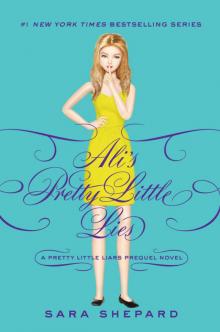 Alis Pretty Little Lies
Alis Pretty Little Lies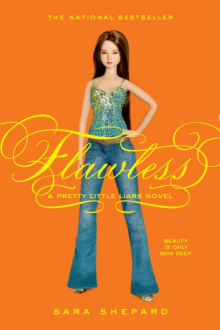 Flawless
Flawless The Elizas
The Elizas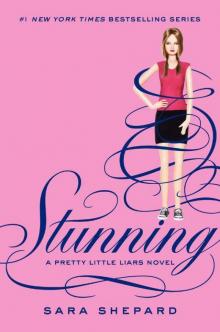 Stunning
Stunning Pretty Little Secrets
Pretty Little Secrets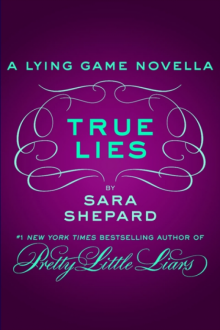 True Lies
True Lies The Good Girls
The Good Girls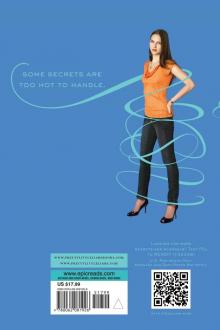 Burned
Burned Perfect
Perfect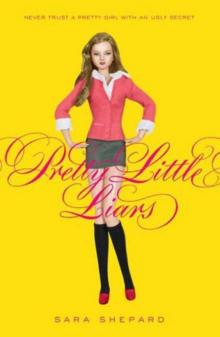 Pretty Little Liars
Pretty Little Liars Unbelievable
Unbelievable Deadly
Deadly Vicious
Vicious Crushed
Crushed The First Lie
The First Lie Cross My Heart, Hope To Die
Cross My Heart, Hope To Die The Lying Game
The Lying Game Wicked
Wicked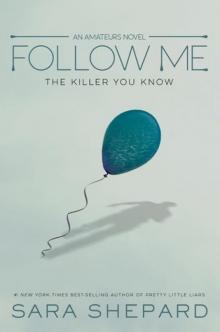 Follow Me
Follow Me Seven Minutes in Heaven
Seven Minutes in Heaven The Perfectionists
The Perfectionists Killer
Killer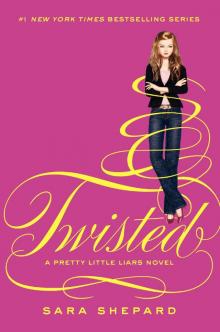 Twisted
Twisted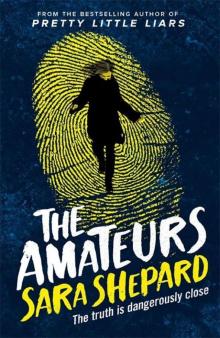 The Amateurs
The Amateurs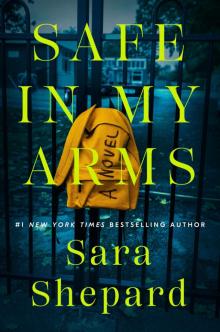 Safe in My Arms
Safe in My Arms Wanted
Wanted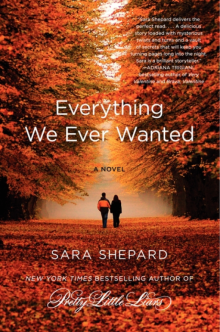 Everything We Ever Wanted
Everything We Ever Wanted Two Truths and a Lie
Two Truths and a Lie The Visibles
The Visibles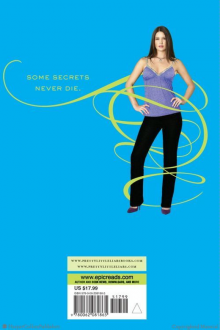 Ruthless
Ruthless Hide and Seek
Hide and Seek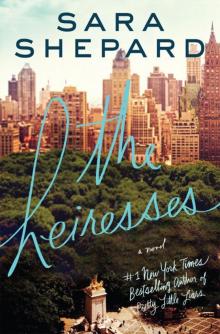 The Heiresses
The Heiresses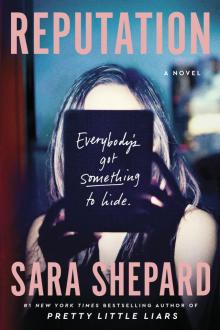 Reputation
Reputation Never Have I Ever
Never Have I Ever Toxic
Toxic Unbelievable pll-4
Unbelievable pll-4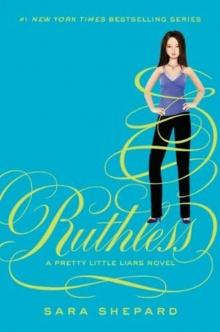 Ruthless pll-10
Ruthless pll-10 Seven Minutes in Heaven tlg-6
Seven Minutes in Heaven tlg-6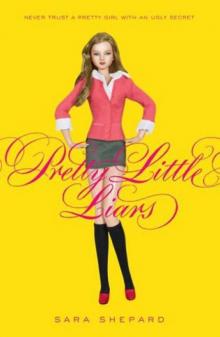 Pretty Little Liars pll-1
Pretty Little Liars pll-1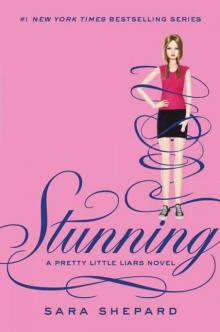 Pretty Little Liars #11: Stunning
Pretty Little Liars #11: Stunning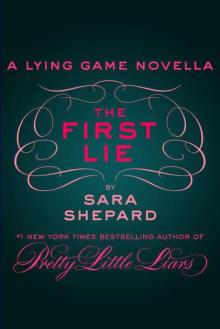 4.5 The First Lie (the lying game)
4.5 The First Lie (the lying game) The Amateurs, Book 3
The Amateurs, Book 3 Wanted pll-8
Wanted pll-8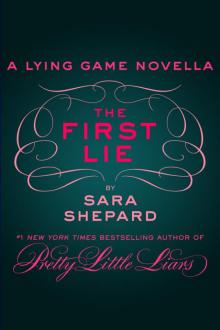 Lying Game 00: The First Lie
Lying Game 00: The First Lie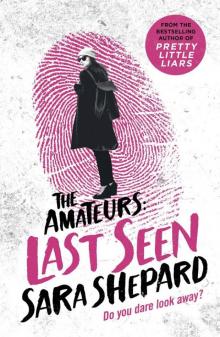 The Amateurs: Last Seen
The Amateurs: Last Seen The Lying Game #6: Seven Minutes in Heaven
The Lying Game #6: Seven Minutes in Heaven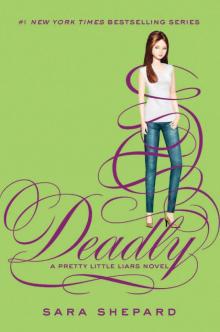 Pretty Little Liars #14
Pretty Little Liars #14 All the Things We Didn't Say
All the Things We Didn't Say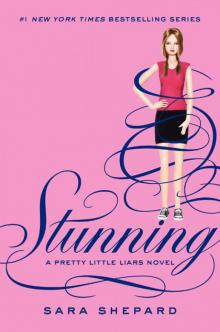 Stunning pll-11
Stunning pll-11 Heartless pll-7
Heartless pll-7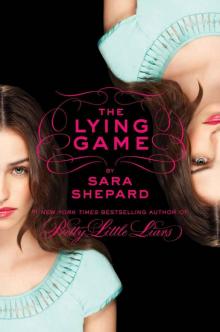 The Lying Game tlg-1
The Lying Game tlg-1 The Elizas_A Novel
The Elizas_A Novel Perfect pll-3
Perfect pll-3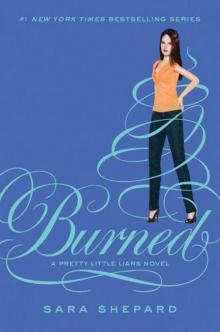 Burned pll-12
Burned pll-12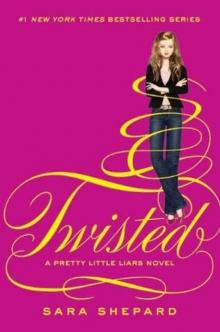 Twisted pll-9
Twisted pll-9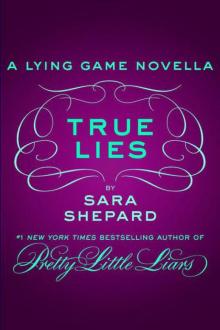 True Lies: A Lying Game Novella
True Lies: A Lying Game Novella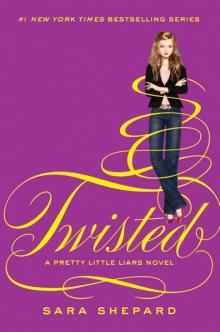 Pretty Little Liars #9: Twisted
Pretty Little Liars #9: Twisted Two Truths and a Lie tlg-3
Two Truths and a Lie tlg-3 Crushed pll-13
Crushed pll-13 Pretty Little Liars #15: Toxic
Pretty Little Liars #15: Toxic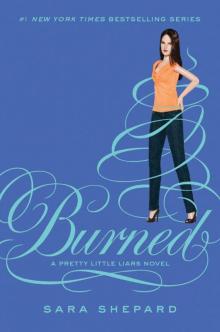 Pretty Little Liars #12: Burned
Pretty Little Liars #12: Burned Killer pll-6
Killer pll-6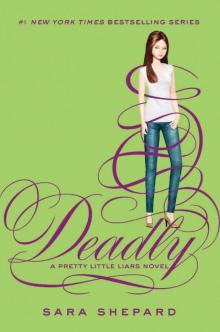 Pretty Little Liars 14: Deadly
Pretty Little Liars 14: Deadly